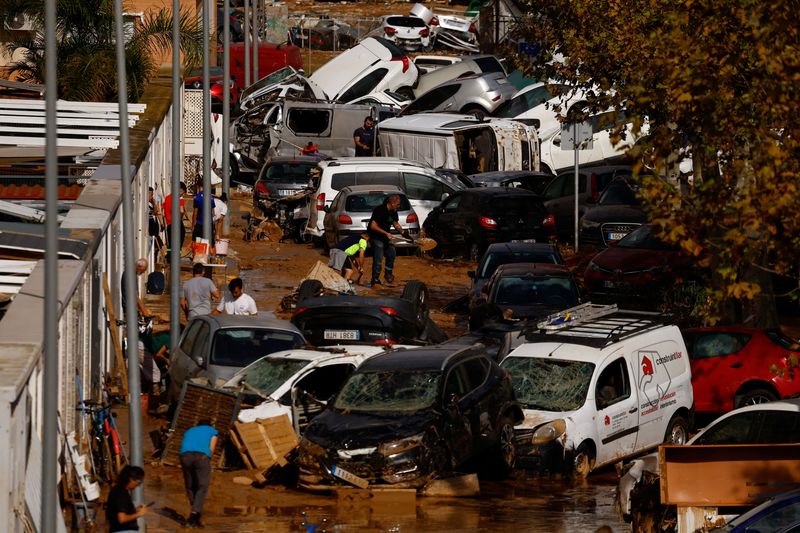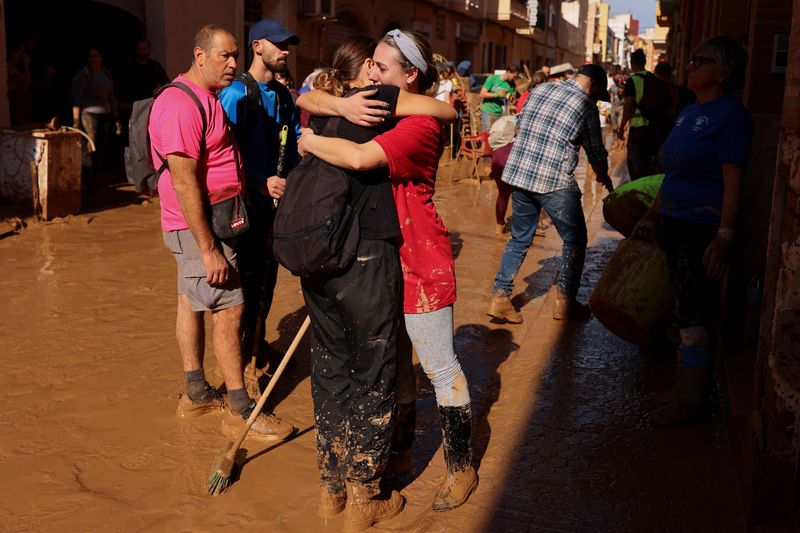
By David Latona and Charlie Devereux
ALFAFAR, Spain (Reuters) -Spanish rescuers opened a temporary morgue in a convention centre and battled to reach areas still cut off on Friday as the death toll from catastrophic floods rose to 205 people in Europe’s worst weather disaster in five decades.
In Valencia, the eastern region that bore the brunt of the devastation, about 500 soldiers were deployed to hunt for people who are still missing and help survivors of the storm, which triggered a fresh weather alert in Huelva in southwestern Spain.
Officials said the death toll is likely to keep rising. It is already Spain’s worst flood-related disaster in modern history and the deadliest to hit Europe since the 1970s.
In Alfafar, a suburb outside the city of Valencia, Spain’s third-largest, drone footage showed the tangled wreckage of dozens of vehicles strewn across rail tracks.
“It’s all destroyed, shops, supermarkets, schools, cars,” said local resident Patricia Villar. Close by, a boat that had been carried by the floodwaters lay on a muddy street corner.
Emergency services working to clear cars piled up at the entrance of a flooded underpass in the suburb feared finding more trapped bodies.
“We’re trying to remove vehicles bit by bit to see if there are victims,” one rescue worker told state television. “We don’t know.”
With about 75,000 homes still without electricity, firefighters were siphoning petrol from cars that had been abandoned in the floods to power generators to get domestic supplies back on.
“We’re going from car to car looking for any petrol we can find,” said one firefighter who had travelled to Valencia from the southern region of Andalusia to assist rescue efforts, carrying a plastic tube and empty bottles to collect the petrol from the cars’ tanks.
A YEAR OF RAIN
A year of rain fell in just eight hours on Tuesday night, destroying roads, railway tracks and bridges as rivers burst their banks.
The flooding also submerged thousands of hectares of farmland in the region, which produces nearly two-thirds of citrus fruit in Spain – the world’s top exporter of oranges.
“The magnitude of the catastrophe has no precedent,” Transport Minister Oscar Puente told local television.
While the waters have subsided in most parts of Valencia, emergency services have still not been able to reach a few areas due to blocked roads. They included Albal, a neighbourhood close to Alfafar, one resident said.
Supplies of bottled drinking water were running low in some places and residents in the Valencia suburb of Paiporta were taking turns to guard shops after authorities said 50 people had been arrested for looting.
Standing in a churned up street as neighbours and volunteers did what they could to clean up in Paiporta, resident Amber Gonzalez, 72, said rebuilding and recovering from the floods would take time.
“No matter how much help we get it is not enough,” she said. “This is not going to be fixed in a month or two.”
As the death toll rose, a temporary morgue was set up at the Feria Valencia convention centre on the outskirts of Valencia city, emergency services said, and the first bodies started to arrive early on Friday.
The number of deaths has prompted anger as well as grief in Spain, with some people accusing authorities of being poorly prepared and not having warned people soon enough about the dangers posed by the storm.
Valencia resident Hector Bolivar, 65, questioned why a text message alert was only sent out at 8 p.m. when the heavy rain had begun several hours earlier.
The president of Valencia’s regional government, Carlos Mazon, has said all protocols for disaster management were followed and that authorities began warning people from Sunday.
The death toll is the highest from floods in Europe since 1970, when 209 people died in Romania.

Scientists say extreme weather events are becoming more frequent due to climate change. Meteorologists think the warming of the Mediterranean, which increases water evaporation, plays a key role in making torrential rains more severe.
“Regarding these environmental catastrophes, we pray for the people of the Iberian Peninsula, especially the Valencian Community, swept away by the storm,” Pope Francis said on Friday as he led prayers in St. Peter’s Square in the Vatican.
This post is originally published on INVESTING.




